Dogs need a variety of different things in their diet to remain healthy.
Some of these things, such as protein and an assortment of vitamins and minerals, are found in just about every decent dog food on the market. But there are plenty of other things your dog needs, which are only found in high quantities in some of the very best (and often most expensive) foods.
Fortunately, modern dog owners have access to a variety of different supplemental products, including fish oils, which can help satisfy these additional needs while still allowing you to feed your dog affordable food.
What Needs Do Fish Oil Supplements Satisfy For Dogs?

Dogs – like most other animals – require things called omega fatty acids to develop properly and remain in good health. Dogs can make some types of these acids themselves, but others called essential fatty acids, must be acquired from their food.
Two of the most important essential fatty acids are eicosapentaenoic acid (EPA) and docosahexaenoic acid (DHA). They each play a slightly different role in your dog’s body, but they are both considered omega-3 fatty acids. These important molecules are not especially easy to obtain, as they are only found in a relative handful of foods.
Chia seeds are one such example, and flaxseed is another. But some of the best sources of omega-3 fatty acids come from the ocean — particularly fatty fish species and cold-water fish, such as salmon, herring, and anchovies.
There are a few different kinds of omega fatty acids that are important to your dog’s health, but the two most notable include omega-3 fatty acids and omega-6 fatty acids.
Both of these omega fatty acids are important for your dog’s health, but they help support different bodily functions.
Generally speaking, omega-6s promote inflammatory responses, while omega-3s dampen inflammatory responses. Both processes are important, but they must be kept balanced.
Accordingly, it is important that your dog receives the proper ratio of omega-6s to omega-3s in his diet. The optimum ratio for dogs has not yet been determined, but it is likely in the range of 5:1 to 10:1, as it is in humans
However, most dog foods have ratios much higher than this — often in the range of 20:1. This is still within the AAFCO’s guidelines, but it demonstrates part of the reason many owners provide supplemental omega-3s to their pets.
The 8 Best Fish Oil Supplements for Dogs
If you want to try fish oil for your dog, give the following options serious consideration.
1. Zesty Paws Pure Salmon Oil
About: Zesty Paws Wild Alaskan Salmon Oil is an all-natural, nutritious supplement designed to provide your pooch with the omega-3s that he needs to stay healthy. It comes in a handy pump bottle, which makes it easy to squirt onto your dog’s food.
Form: Liquid
Features:
- Made from wild-caught Alaskan salmon rather than farmed fish
- Contains no additives or preservatives
- Safe for dogs and cats
- Made in FDA-registered facilities in the USA
Pros
- Appears very effective at correcting problems like dry or flaky skin and poor coat condition
- Most dogs seem to like the taste
- Some of the most impressive ingredient sourcing in the product category
Cons
- Owners reported a few issues with broken pumps and leaking bottles (but they also reported that the manufacturer addressed such problems promptly)
- Minor gastrointestinal distress occurred for several dogs
Ingredient List: 100% Salmon Oil
2. Grizzly Salmon Oil
A premium salmon oil supplement that's packed with omega-3 fatty acids.
About: Grizzly Salmon Oil is a premium fish oil supplement that serves as a great way to provide your dog with the omega fatty acids your dog needs. Grizzly Salmon Oil is packaged in a pump-style bottle, making it easy to administer to your dog (simply squirt the recommended dosage of fish oil on your dog’s food).
Form: Liquid
Features:
- Made solely from wild-caught Alaskan salmon
- Contains more than 15 different fatty acids
- All-natural recipe helps prevent gastrointestinal distress
- Made in the USA and bearing the NASC’s quality seal
Pros
- Appears to be very helpful for addressing skin and coat issues in dogs
- Several owners reported improved joint health and mobility in dogs after use
- Most dogs seem fond of the flavor
Cons
- Small number of dogs suffered digestive upset after consuming this fish oil
- Fairly expensive supplement when compared with some other options
Ingredient List: 100% Salmon Oil
3. Best Paw Pure Alaskan Salmon Oil
A US-made supplement containing no mercury or BPA and made from Alaskan salmon oil.
About: Best Paw’s Pure Alaskan Salmon Oil is a great product that will help improve your pup’s skin health and coat condition. Thanks to the pump-bottle design, it is quick and easy to mix Best Paw Alaskan Salmon Oil with your dog’s food.
Form: Liquid
Features:
- Made from only wild-caught Alaskan salmon
- Contains no mercury, BPA, additives, or preservatives
- Made entirely in the USA
- Also available in soft-gel form
Pros
- Earned better owner reviews than any other fish oil we found
- Very easy to dispense and mix with your dog’s food
- Customer service department received rave reviews from owners
Cons
- Appears to work very well for dogs, but cat owners reported more problems
- Shipping problems seem to pop up more often than usual
Ingredient List: 100% Salmon Oil
4. Native Pet Omega Oil
A wallet-friendly, liquid fish oil supplement packaged in an easy-to-use pumped bottle.
About: Made with wild-caught, DHA-rich American fish, Native Pet Omega Oil nourishes your pup’s joints and coat without blowing a hole in your budget. This liquid formula doesn’t include artificial flavors or additives, sticking to the good stuff for your four-footer and avoiding a mile-long ingredient list.
Form: Liquid
Features:
- Veterinary nutritionist-designed recipe
- Made using a cold-pressed technique to preserve nutrients
- Available in 8-ounce and 16-ounce pump bottles
- Made in the USA
Pros
- Affordably priced, which is ideal for families with large dogs or multiple mutts
- Most pup parents report that canines love the taste
- Very easy to dispense and administer
Cons
- Fishy breath can be a little overwhelming to sensitive human noses
- Some owners reported issues with a leaky pump
Ingredient List: Wild-caught pollock oil, wild-caught salmon oil, wheatless wheat germ oil, Vitamin B7, Vitamin E
5. Nordic Naturals Omega-3 Soft Gels
Premium soft gels made from wild anchovies and sardines with no artificial additives.
About: Unlike most other fish oil supplements in our review, which are salmon-based, Nordic Naturals Omega-3 Soft Gels derive their omega fatty acids from anchovies and sardines. Because it is made from the same oil that Nordic Naturals uses in their human products, you can rest assure your dog is getting the best quality possible.
Form: Gel tablets
Features:
- Made without any artificial colors, flavors, or dyes
- The fish oil is processed in Norway, while the soft gels are manufactured in the USA
- Third-party tested for purity
- The product remains effective for 2 years after opening
Pros
- Owners reported their dogs enjoyed softer fur and healthier skin after using these supplements
- Many dogs were willing to take these supplements willingly
- Very few adverse effects were reported by owners
Cons
- Aren’t the most cost-effective supplements for large dogs
- A very small number of owners reported digestive issues
Ingredient List: Anchovy oil, sardine oil, gelatin, water, glycerin, and d-alpha tocopherol
6. Nutri-Vet Fish Oil Supplement
A cost-conscious, American-made fish oil capsule that’s NASC-approved for quality.
About: The Nutri-Vet Fish Oil Supplement comes in soft gel capsules that can be slipped into your dog’s food or emptied over kibble for a healthy serving of omega-3s and antioxidants. Packaged in 100-count bottles, these fish oil pills give you a lot of bang for your dog-care buck.
Form: Capsule
Features:
- Softgel capsule keeps the fishy odor (and mess!) inside
- Has a quality seal of approval from the National Animal Supplement Council (NASC)
- Contains 180 milligrams EPA and 120 milligrams DHA per capsule
- Made in the USA
Pros
- Super affordable price saves you cash
- Great, mess-free way to give your dog fish oil
- Less fishy breath issues than liquid fish oil
Cons
- The fish species used in the supplements aren’t identified
- Hiding capsules in food can be tricky, especially with super picky pups
Ingredient List: Fish oils, gelatin, glycerin, water, D-Alpha tocopherol, vitamin A palmitate, vitamin D3
7. Amazing Nutritionals Omega 3 Chews
A soft fish oil chewable made with meaty flavor dogs love and without a fishy fragrance.
About: Amazing Nutritionals Omega 3 Chews are a palate-pleasing pick for serving your dog omega-3s without the overwhelming stink of fish. Just serve on their own or crush over food for a nourishing treat.
Form: Chewable tablet
Features:
- Contains 150 milligrams fish oil per 3 chewables
- Available in Bacon & Liver and Smoked Salmon flavors
- Comes with a GMP quality seal
- Made in the USA
Pros
- Most pups like the taste
- Less messy to feed than liquid supplements
- Comes with a 100-percent money-back guarantee from the manufacturer
Cons
- Some owners found the smell to be off-putting
- Long list of ingredients can be an issue with dogs with food sensitivities
Ingredient List (Smoked Salmon Flavor): Fish oil, sunflower oil, evening primrose oil, dicalcium phosphate, microcrystalline cellulose, desiccated pork, whey, stearic acid, bacon flavor, magnesium stearate, silicon dioxide
8. Nordic Naturals Omega-3 Pet
A no-fuss supplement applied directly to your doggo’s food with omega-3s derived from sustainably-harvested anchovies and sardines.
About: Nordic Naturals Omega-3 Pet is a liquid supplement that allows for measuring the exact dosage your pup needs. Packing a whopping 368 milligrams EPA and 253 milligrams DHA per half teaspoon, it’s a concentrated formula that’s better absorbed than many other supplements.
Form: Liquid
Features:
- Made with wild-caught fish
- Available in bottle sizes for small, medium, large, and extra-large doggos
- Undergoes third-party testing for purity and freshness
- Made in Norway
Pros
- Can measure out exactly what your dog needs for a truly customized dosage
- Easily mixes into food, allowing for stress-free feeding (no more hiding pills!)
- Unflavored formula works great with pickier puppers
Cons
- Somewhat pricier than other options
- Can be messy
Ingredient List: Anchovy oil, sardine oil, D-alpha tocopherol
One Fish Oil to Avoid: NOW Foods Wild Alaskan Salmon Oil

As with any supplement, you need to do your homework to sort out problem products when browsing fish oil supplements. Unfortunately, not every manufacturer follows safe practices, putting canines at risk.
One to avoid is NOW Foods Wild Alaskan Salmon Oil. This brand, along with others, was found to be contaminated with PCB in 2010, a man-made chemical with known carcinogenic properties.
Such contaminations are a known issue in the fish oil market, making diligence a must to avoid harmful pup products.
The Health Benefits of Fish Oil: Omega-3 Supplements FTW!

Some of the health benefits of fish oil are relatively minor, but others can profoundly improve your pet’s quality of life.
The omega-3 fatty acids in fish oils help to:
Support good joint health. Of all the health issues owners use fish oil for, promoting good joint health is probably the most common. Some owners use it proactively to help prevent joint problems from occurring, while others rely on it to treat dogs who’re already suffering from poor joint health.
Improve coat condition and reduce shedding. Many owners are quite shocked at just how soft and shiny their dog’s fur becomes after providing their pet with supplements for a few months.
Soothe itchy skin. Along with improvements in your dog’s hair, omega-3s often improve your dog’s overall skin condition. These types of benefits are most pronounced in dogs with dry skin.
Promote proper brain and eye development in puppies. Proper brain and eye development is crucial for your dog’s long-term well-being, and fish oils can help ensure your new pupperino gets everything he needs. Additionally, supplements containing fish oil have been shown to improve cognitive function in some cases.
Reduce inflammation. Because the inflammation-reducing characteristics of omega-3s work throughout your dog’s body, they can help in a variety of different ways. This means that no matter where your dog is experiencing inflammation – be it his heart, kidneys, joints, or any number of other places – fish oil supplements may help.
Promote heart health. We know that omega-3s can have beneficial effects for humans who have heart disease or are experiencing problems with their heart health, and some scientists suspect that the same will hold true for dogs — particularly those suffering from arrhythmias.
Provide some pain relief. Because inflammation often causes pain, the inflammation-reducing traits of omega-3s often reduce your dog’s pain too. This is particularly true for dogs suffering from joint diseases.
Potentially provide benefits for dogs with cancer. Although much more research must be conducted before scientists will be able to say omega-3s provide concrete benefits for canines suffering from cancer, there is some evidence in humans that this is the case.
Potential Side Effects of Fish Oil Supplements: Adverse Effects of Omega-3s

While fish oil supplements are generally regarded as safe, it is important for pet parents to use them carefully and be aware of the potential adverse effects that they can (rarely) cause. Some of the most noteworthy side effects include:
Some omega-3 fatty acids (including both EPA and DHA) can cause your dog’s body to stop clotting correctly. It probably won’t cause your dog to suffer from significant bleeding, but it is an important fact to be aware of.
The inflammatory-reducing effects of omega-3s slow the healing process and suppress the production of white blood cells, which your body uses to fight off infections. Accordingly, you may want to think twice about providing fish oils to dogs that are suffering from an injury or illness.
Some dogs are unable to properly digest fish oil supplements, which can lead to intestinal upset. Although these problems often resolve on their own with time, it certainly isn’t fun for your dog in the meantime.
Some fish oils can give dogs bad breath. This won’t really bother your dog, but you may not like fish-breath kisses from your pup. You can generally put a stop to this problem by simply reducing the amount of supplement you provide at each meal.
Some dogs will experience weight gain after taking these types of supplements. Because fish oil is essentially fat, it is chock full of calories. To prevent your pooch from packing on the pounds, be sure to account for these additional calories you’re providing.
While these types of problems are relatively rare, it is always a good idea to discuss fish oil supplementation with your vet before you start giving your dog additional omega-3s. Additionally, you’ll always want to be sure to follow the manufacturer’s recommendations regarding the amount of supplement to provide your dog.
Picking a Good Fish Oil Supplement

There are countless fish oil supplements on the market, and owners are often overwhelmed by the number of options available. Aside from simply scrolling down to our list of five recommended products, you should try to keep the following considerations in mind:
Choose Supplements Made from Wild-Caught Fish
More and more of the seafood that makes its way into grocery stores and dog foods is coming from fish farms these days.
Commercially farmed fish often accumulate very high levels of heavy metals, toxins, and other potentially harmful ingredients, so it is best to avoid them in favor of wild-caught fish.
Select Products Made in a Country with Strict Quality-Control Standards
As with most other things you purchase for your dog, you want to be sure that the fish oil you provide your dog is not tainted with toxic chemicals or undesirable ingredients. The best way to do this is by purchasing products manufactured in a country with high health and safety standards, which includes the USA, Canada, Western Europe, and Australia.
Consider the Form You Want the Supplement to Take
You can get an omega-3 supplement in either liquid or capsule form. While neither is inherently better than the other, many owners and dogs prefer one form over the other.
Capsules are easier to administer if your dog will swallow them voluntarily, but liquid fish oils are better if you need to mix them in with your dog’s food. In fact, many dogs love the taste of these oils.
Fish oil supplements aren’t the only way to give your dog some extra omega-3 fatty acids — you can also feed your dog one of the many pet foods with added omega-3s.
Check out our article about the best dog foods for joint health for some recommendations!
Fish Oil Supplement FAQ: Frequently Asked Fishy Questions
Do you have lingering questions or concerns about fish oil supplements for dogs? Check out these popular Q&As.
Can I give my dog human fish oil pills?
No. Human fish oil supplements often contain added flavor and include higher doses of fatty acids than canine fish oil. Always opt for fish oil supplements made for dogs.
What type of fish oil is safe for dogs?
The safest fish oil supplements for dogs are those made specifically for dogs. You also want a made-in-the-USA product that’s sourced from wild-caught fish and tested for safety. Never offer your dog human fish oil supplements.
How much human fish oil can I give my dogs?
None. To prevent accidentally overdosing your dog or making him sick with added flavoring, avoid human fish oil and stick to fish oil supplements made specifically for dogs.
What type of omega-3 is best for dogs?
The best omega-3 supplement for your dog is one that’s safe, palatable to him, and fits within your budget. Some canines prefer fishy liquid preparations, while others like a chewy tablet with an alternative flavor.
For safety’s sake, opt for a product made in the USA whenever possible and stick to reputable manufacturers who perform purity and safety checks. If you’re unsure which brand or preparation is best for your dog, ask your vet.
Do dogs like fish oil?
Most doggy diners like fish oil, with the fish-forward liquid especially functioning as a healthy dog food topper that encourages picky dogs to eat their kibble. For dogs (or humans) who dislike the smell of fish, fish oil capsules can be hidden in pill pockets for easy feeding.
What is the difference between human and dog fish oil?
Human fish oil supplements may have added flavoring as well as higher doses of fatty acids that can make your dog ill. Never give your dog supplements intended for humans. Stick to canine-specific supplements.
Is olive oil or fish oil better for dogs?
While both oils contain healthy fats, fish oil is the better choice overall since it contains the omega-3 fatty acids EPA and DHA that aid in brain and eye health, along with nourish your dog’s skin and coat.
Is omega-3 better than fish oil for dogs?
Omega-3 fatty acids are found in fish oil, along with omega-6 fatty acids. Omega-3 fatty acids include docosahexaenoic acid (DHA) and eicosapentaenoic acid (EPA).
Can dogs have omega-3 every day?
Yes, dogs can have omega-3 fatty acids daily. Follow the fish oil supplement’s dosage instructions that suit your dog’s weight, or ask your vet.
What are the side effects of fish oil for dogs?
Fish oil can lead to weight gain in dogs, as it’s high in fat and calories. This richness can also cause stomach upset in some pups.
More seriously, fish oil can potentially cause your dog’s blood to stop clotting correctly if he’s injured, as well as suppress the production of white blood cells that fight infections.
As with any supplement, ask your vet if fish oil is the right supplement for your dog before offering it. This is particularly important if he has underlying medical conditions.
What happens if I give my dog too much fish oil?
Too much fish oil can lead to stomach upset, including vomiting and diarrhea. The fatty, calorie-dense nature can also lead to weight gain in dogs over time.
Should older dogs take fish oil?
Older dogs can benefit from the DHA found in fish oil, as it aids in brain health, potentially helping with senior canine cognitive issues like Sundowners syndrome. Fish oil can also combat inflammation, a common issue in older dogs with joint issues.
If you’re considering giving your older doggo fish oil, ask your vet if it’s a good fit for him.
Do you have a fish oil supplementation regimen that has worked well for you and your dog? What types of fish oil supplements do you prefer? Have you found soft gel supplements or liquid fish oil easier to administer? Have you seen the kind of results you expected? Has your pooch suffered from any adverse effects from the oils?
Let us know all about your experiences in the comments below.


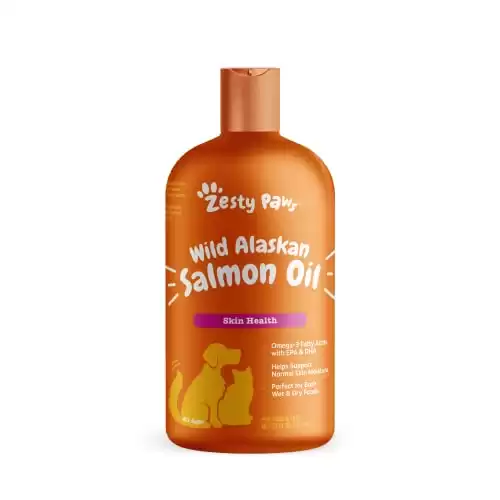
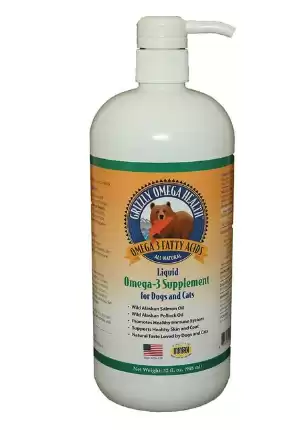
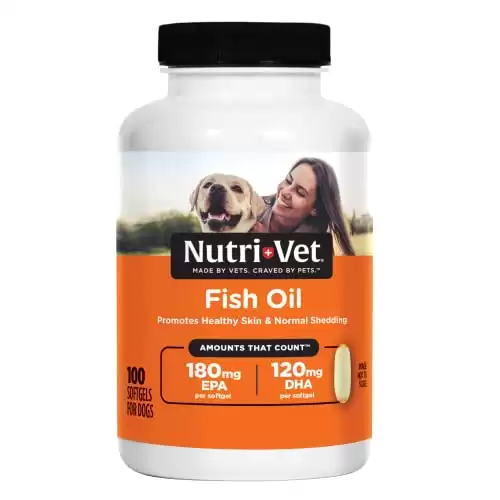

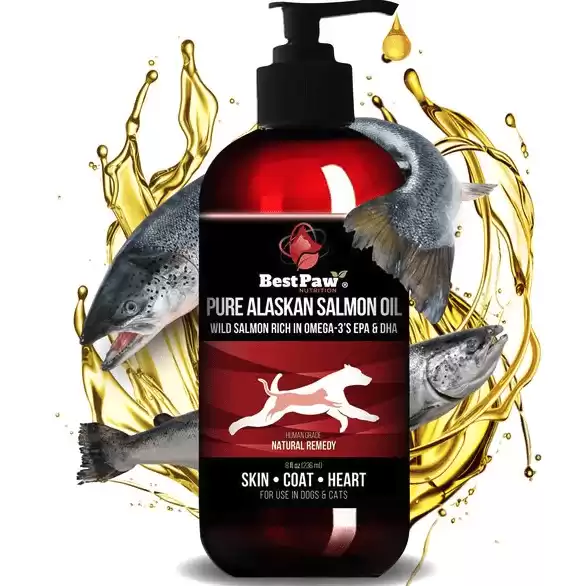


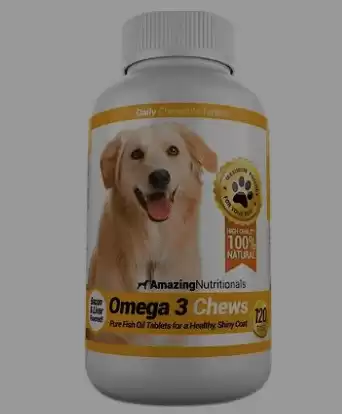
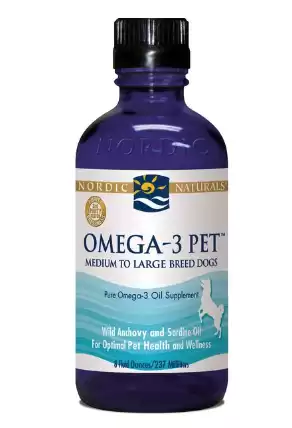








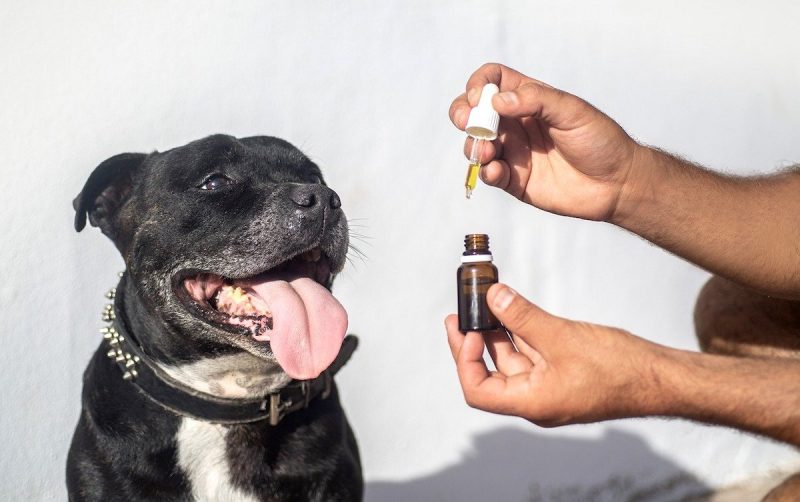


Leave a Comment